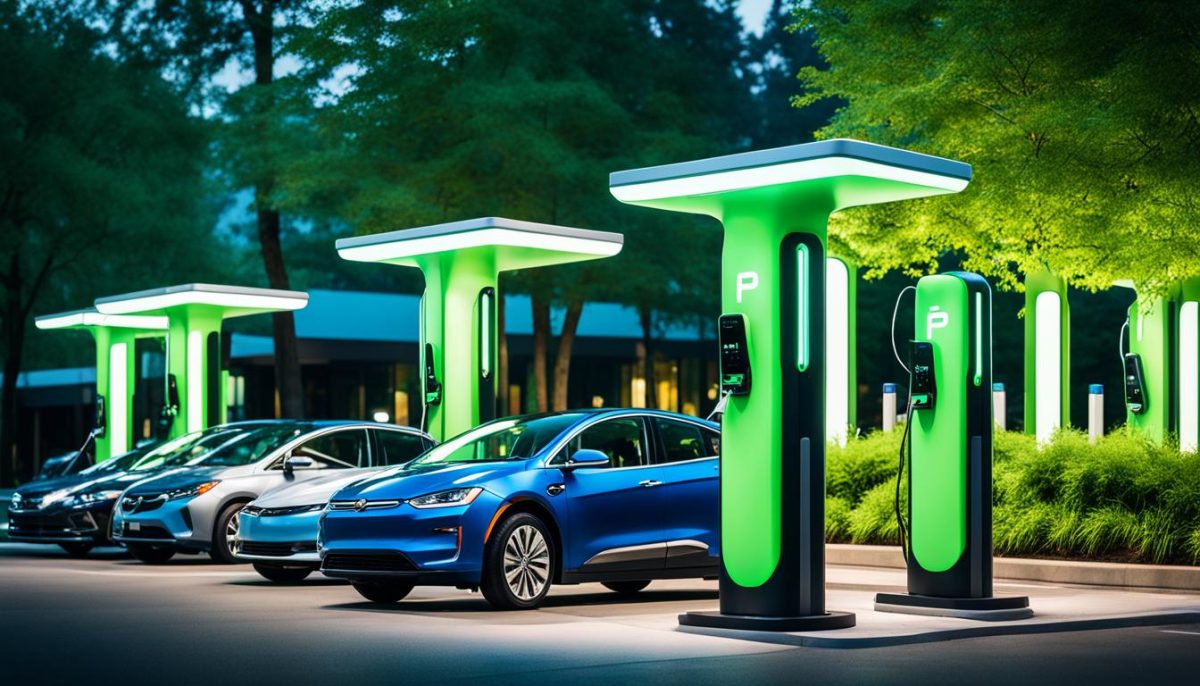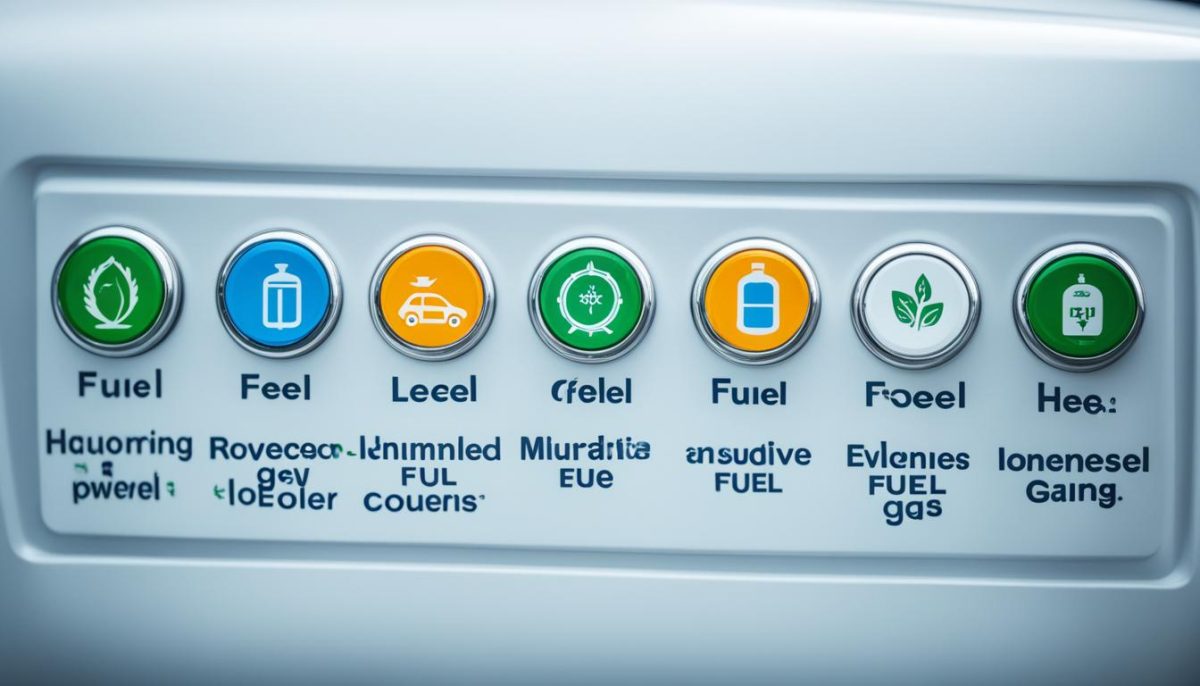As we strive towards a greener and more eco-friendly future, the search for sustainable alternatives to conventional fuels has become increasingly crucial. In this article, we will explore the different types of alternative fuels that can power automobiles, paving the way for a cleaner and more sustainable transportation industry.
When it comes to alternative fuels for automobiles, there are several options available that offer reduced carbon emissions and environmental benefits. These alternative fuels not only help combat climate change but also contribute to energy security and reduce dependence on fossil fuels.
In the following sections, we will delve into the specific types of alternative fuels and their advantages. From biofuels derived from renewable organic materials to electricity that powers electric vehicles, we will explore the diverse options that are shaping the future of transportation.
Join us as we discover the potential and possibilities of these alternative fuels, exploring their impact on the environment and their role in creating a sustainable and cleaner mobility ecosystem.
Biofuels
As we look for sustainable alternatives to traditional fuels, biofuels have emerged as a promising option. Derived from renewable sources such as plants and organic materials, biofuels offer several benefits in reducing greenhouse gas emissions and promoting a greener future for transportation.
Types of Biofuels
One common type of biofuel is ethanol. Ethanol is produced through the fermentation of crops like corn or sugarcane, and it can be used as a fuel additive or as a standalone fuel. Its use in automobiles can help reduce carbon dioxide emissions and decrease our reliance on fossil fuels.
Another widely used biofuel is biodiesel. Biodiesel is derived from vegetable oils or animal fats and can be blended with traditional diesel fuel or used on its own. It offers similar environmental benefits to ethanol, including lower carbon emissions and improved air quality.
Production Processes
The production of biofuels involves specific processes to extract and refine the fuel from the source material. For ethanol, crops like corn or sugarcane are harvested and processed to extract the sugars, which are then fermented and distilled to produce ethanol. Biodiesel, on the other hand, requires the conversion of vegetable oils or animal fats through a process called transesterification.
Benefits of Biofuels
Biofuels play a crucial role in reducing our carbon footprint and combating climate change. By utilizing biofuels like ethanol and biodiesel, we can significantly reduce greenhouse gas emissions compared to traditional fossil fuels. Biofuels also contribute to improved air quality, as they produce fewer harmful pollutants when burned.
Furthermore, biofuels help promote agricultural diversity and rural development. The production of biofuels relies on crops and organic materials, creating opportunities for farmers and fostering economic growth in rural communities.
Electricity
Electric vehicles (EVs) have gained significant popularity in recent years as a sustainable alternative to traditional gasoline-powered cars. By using electricity as fuel, EVs emit lower levels of greenhouse gases, leading to reduced carbon emissions and improved air quality. This makes them an appealing option for individuals looking to reduce their environmental impact.
The advancements in electric vehicle technology have resulted in improved performance and longer driving ranges. Modern EVs can now travel hundreds of miles on a single charge, providing a practical and reliable mode of transportation for daily commutes and longer trips.
However, the widespread adoption of electric vehicles requires a robust infrastructure of charging stations. These stations serve as the refueling points for EVs, allowing drivers to recharge their vehicles conveniently. Charging stations can be found in various locations, including public areas, workplaces, and residential complexes. The availability of charging stations is continuously expanding, making it easier for EV owners to charge their vehicles while on the go.

The presence of a well-established charging network is crucial for the success of electric vehicles. It provides peace of mind to EV owners, as they can access charging facilities whenever needed, without worrying about running out of battery power.
Furthermore, governments and businesses are actively investing in the development of charging infrastructure to support the increasing demand for electric vehicles. This includes the installation of fast-charging stations that can quickly replenish an EV’s battery in a short amount of time.
As the world continues to prioritize sustainability and reduce reliance on fossil fuels, the use of electricity as fuel for automobiles, specifically through electric vehicles, will play a significant role in achieving these goals. The advancements in electric vehicle technology and the expansion of charging infrastructure are key factors driving the widespread adoption of electric vehicles.
Hydrogen Fuel Cells
Hydrogen fuel cells offer a promising solution as an alternative to conventional gasoline engines. These cells generate electricity by combining hydrogen with oxygen, producing only water vapor as a byproduct. This clean and efficient process has immense potential to revolutionize transportation and reduce harmful emissions.
The technology behind hydrogen fuel cells is fascinating. As hydrogen passes through the anode, it splits into positively charged protons and electrons. The protons then move through a membrane to the cathode, while the electrons are directed through an external circuit, generating electrical power. This innovative system not only provides a sustainable energy source but also offers quiet operation, smooth acceleration, and long ranges.
However, the widespread adoption of hydrogen fuel cells faces challenges, one being the development of a robust hydrogen infrastructure. Building an extensive network of fueling stations and establishing a reliable supply chain for hydrogen is crucial for the success of fuel cell vehicles. Despite these obstacles, significant progress is being made, with countries and companies investing in hydrogen infrastructure initiatives.
The potential for fuel cell vehicles is undeniable. With their longer ranges, quick refueling times, and zero emissions, they could play a vital role in creating a sustainable transportation future. As advancements in technology continue, overcoming barriers and increasing accessibility to hydrogen, fuel cell vehicles have the potential to revolutionize the automotive industry, offering a cleaner and greener alternative for transportation needs.

